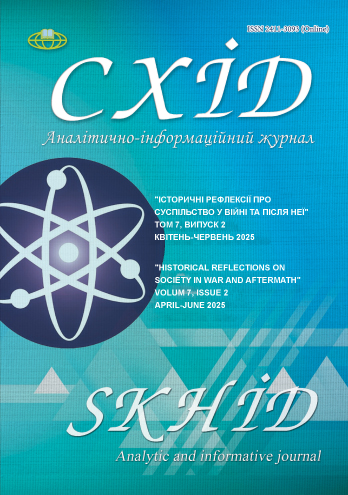Collective Memory in Ukraine as a Factor in Identity Formation in the Context of Postmodernity
DOI:
https://doi.org/10.21847/2411-3093.2025.726Keywords:
collective memory, collective identity, Postmodernity, competitive nature of collective memory, personalization of identity, Ukrainian historical narrative, symbolic realityAbstract
This article explores the problem of collective memory as a foundation for the construction of Ukrainian collective identity. The authors argue that identity formation in the postmodern era is characterized by personalization, flexibility, and the ambivalent influence of globalization. The study demonstrates that Ukrainian collective memory represents a polyphony of interpretations rather than a homogeneous reflection of the past. Its competitive and composite nature is conceptualized not as a weakness, but as a source of pluralism, adaptability, and potential for critical re-evaluation. Accordingly, memory politics in Ukraine is presented as an active process of shaping a desired society. The article emphasizes that in the context of postmodernity and the Russian-Ukrainian war, collective identity in Ukraine is transforming into a dynamic, flexible, and personalized project. This process strongly correlates with Michel Foucault’s concepts of the "technologies of the self," which in the Ukrainian context evolve into ethical, cultural, and historical practices, shaping collective identity as a reflexive and open construction. Through war, memory, and solidarity, Ukrainian society not only defends its statehood but also creates a new moral and symbolic reality, where the personal and national, ethical and aesthetic, private and political are inextricably intertwined. The construction of a distinct national narrative and Ukraine’s postcolonial awakening are shown to be accompanied by the formation of unique historical conceptions, the affirmation of the Ukrainian language, the emphasis on European values, and the deconstruction of shared Russian-Ukrainian myths.
Downloads
References
Aleksandrova, O., & Omelchenko, Y. (2024). Dialogue as an Educational Principle in the “Philosophy of History” Course to Overcome Conflicts of Historical Memory in the Context of Ukraine’s Humanitarian Security. Skhid, 6(4), 69–75. https://doi.org/10.21847/2411-3093.2024.6412
Assmann, A. (2011). Cultural Memory and Western Civi-lization: Functions, Media, Archives. Cambridge University Press
Bauman, Z. (2004). Identity: Conversations with Benedetto Vecchi. Polity Press.
Buyskykh, Yu. (2018, 24 Mai). "Berehynya": sproba dekonstruktsiyi odnoho "kabinetnoho" mifa. Ukrayina Moderna. Retrieved from http://resource.history.org.ua/cgi-bin/eiu/history.exe?C21COM=2&I21DBN=ELIB&P21DBN=ELIB&Image_file_name=book/0013838.pdf&IMAGE_FILE_DOWNLOAD=0
Chyk, A. (2016). Kolektyvna pamyatʹ yak osnova konsol-idatsiyi ukrayinstva. Visnyk Kyyivskoho natsional-noho universytetu imeni Tarasa Shevchenka. Ukrayinoznavstvo. Issue 1, 61-63. http://nbuv.gov.ua/UJRN/VKNU_ukr_2016_1_19 (In Ukrainian)
Dzihora, K. (2024). Istorychna pamyat u dzerkali postmodernoyi metodolohiyi. Humanities Studies, 19 (96), 40-48. https://doi.org/10.32782/hst-2024-19-96-04 (In Ukrainian)
Foucault, M. (1988). The History of Sexuality, Vol. 3: The Care of the Self (R. Hurley, Trans.). New York, Vin-tage Books
Giddens, A. (1991). Modernity and Self-Identity: Self and Society in the Late Modern Age. Stanford University Press.
Halbwachs, M. (1967). La mémoire collective. Deuxième édition revue et augmentée. Paris, Les Presses universitaires de France.
Hall, S. (1996). Who Needs 'Identity'? In: Hall, S., & du Gay, P. (Eds.), Questions of Cultural Identity, pp. 1–17. SAGE Publications.
Hrytsak, Ya. (2011). Narysy z istoriyi Ukrayiny: formu-vannya modernoyi natsiyi. Kyiv, Krytyka. (In Ukrainian)
Marples, D. (2007). Heroes and Villains: Creating National History in Contemporary Ukraine. CEU Press.
Marutyan, R. R. (2017). Smyslovi viyny suchasnosti: ukrayinsʹkyy vymir Matrix-divergent. 13.03.2017. http://matrix-info.com/2017/03/13/ROSIYA-GOTUYETSYA-DO-VELYKOYIVIJNY-TU
Nora, P. (ed.) (1997). Les lieux de mémoire. 3 volumes. Collection Quarto, Gallimard.
Ricoeur, P. (2000). La Mémoire, l'Histoire, l'Oubli. Paris, Seuil.
Voytovych, V. (2002). Ukrayinska mifolohiya. Kyiv, Lybid. (In Ukrainian)
Wallerstein, I. (1986). Incorporation of Indian Subcontinent into Capitalist World-Economy. Economic and Political Weekly, 21 (4), pp. PE28-PE39 https://www.jstor.org/stable/4375250
Yekelchyk, S. (2023). Ukraine: What Everyone Needs to Know. Oxford University Press.
Young, J. E. (1993). The Texture of Memory: Holocaust Memorials and Meaning. Yale University Press.
Zhurzhenko, T. (2014). A Divided Nation? Reconsidering the Role of Identity Politics in the Ukraine Crisis. Studies in East European Thought, 66(1–2), 237–262.
Downloads
Published
How to Cite
Issue
Section
License
Copyright (c) 2025 Андрій Вітов, Галина Тимофєєва

This work is licensed under a Creative Commons Attribution-NonCommercial-NoDerivatives 4.0 International License.
1. Authors bear responsibility for the accuracy of facts, quotations, numbers and names used.
2. Manuscripts are not sent back.
3. The publisher does not always agree with the authors' opinion.
4. The authors reserve the right to authorship of the work and pass the first publication right of this work to the journal under the terms of a Creative Commons Attribution-NonCommercial-NoDerivatives 4.0 International License. This license allows others to distribute (copy) the published work for non-commercial purposes, provided there is mandatory attribution to its authors and a link to the first publication in our journal.
5. The authors have the right to conclude separate supplement agreements that relate to non-exclusive work distribution in the form in which it has been published by the journal (for example, to upload the work to the online storage of the journal or publish it as part of a monograph), provided that the reference to the first publication of the work in this journal is included.

